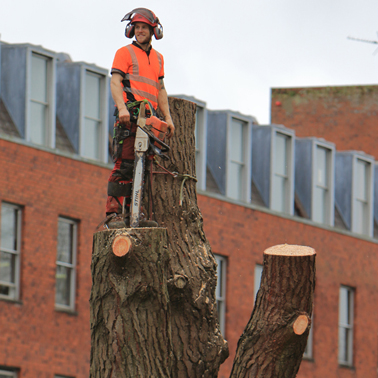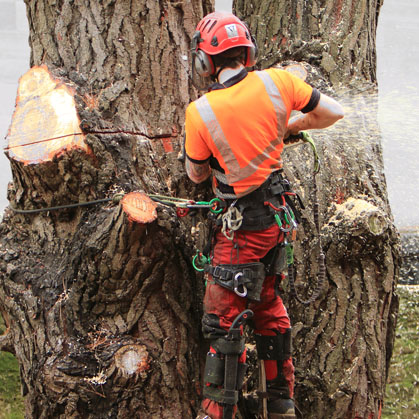
How to Become an Arborist
Working in a job that you’re passionate about has a significant impact on your quality of life. The challenge can be finding a profession that is less of a job, and more of a calling. A typical 9-5, sitting in front of a computer all day in an incandescent-lit office, certainly isn’t for everyone.
If working in the great outdoors with and for nature, and seeing the results of your physical labour, sounds more fulfilling then a career as an arborist may be for you.
What Does an Arborist Do?
Arborists are individuals trained in the art and science of maintaining and caring for individual trees. As well as monitoring and improving the health of trees, arborists are responsible for helping prevent tree damage to power lines, structures and pavements. They do much to preserve valuable old or damaged trees, and at the other end of the scale are often involved in planting new ones. Arborists also help to improve the health of trees and wildlife, treating them for pests and diseases and learning how to balance delicate ecosystems.
The job necessitates a love for trees and nature, good physical ability and stamina, and training in both the skills of modern climbing and the safe use of chainsaws. It’s certainly not a profession for those nervous of heights, as you will spend a lot of your time up in the canopies. Alongside the inevitable exhilaration and some great views, becoming an arborist offers amazing job satisfaction, as you will be personally responsible for carrying out work on trees that will carry long-term results, and often will see the positive results of your hard work relatively quickly.

An arborist can be self-employed, work for a privately owned company, or can find work with a local council or maintenance body employed to care for specific grounds. Although the scope of jobs may change slightly between the various roles, for example looking after domestic gardens in comparison to larger scale parks and universities, the core skills and responsibilities will essentially be the same.
So, if you possess both mental and physical fortitude, these are the types of jobs you may have to take on as an arborist:
- Keep trees and shrubs pruned and maintained in order to enhance urban environments and minimise any risk to public safety.
- Install bracing on damaged, old, or unstable trees
- Carry out various routine tasks such as reducing the size of a tree canopy, lifting the canopy to allow more light, removing or pruning branches that interfere with other structures or create a hazard
- To fell, remove and properly dispose of dead, diseased or dangerous trees.
- Some arborists also get involved in consultancy work such as tree surveys
Why Would You Want to Become an Arborist?
An arborist’s work is both physically and mentally demanding and will require a person to handle dangerous tools and machinery. But, no two trees are the same. Arborism is an exciting and fulfilling role, combining the challenge of facing something new every day with the satisfaction of fulfilling manual labour.
So who becomes an arborist?
- People who are athletic and enjoy physically demanding activities like rock climbing or snowboarding will flourish as an arborist.
- Nature lovers will also find an arborist’s job to be rewarding, as it is part of an arborist’s role to care for and protect tree health. Including learning about preventing afflictions that threaten them, such as diebacks, bleeding cankers, acute oak decline, and other deadly infections that pose a threat even to veteran trees.
- You get to work with some very cheery, passionate, and dependable individuals. Arborists are passionate about their jobs as the demanding nature of the role tends to weed out, excuse the pun, those who are only in it for the paycheck.
The Paths to Becoming an Arborist
One of the biggest advantages of the industry is that the path to becoming an arborist does not necessarily require any formal education. Although some employers prioritize people who have backgrounds in horticulture, landscape design, or arboriculture, most arborists look for relevant experience over education.
There are various colleges around the UK offering training in arboriculture and other land-based studies, as well as freelance trainers. You could seek certification from organisations within the arboriculture industry such as the Arboricultural Association. The Tree Care Industry Association offers a CTSP (Certified Treecare Safety Professional) program, and the International Society of Arboriculture offers certification courses catering to workers of varying experience and skill levels.
There are also different positions from within the industry that can be pursued, depending on a person’s experience/skill level, or commitment:
Grounds Person
This is where most arborists will start out, as it is the entry-level position into the industry. Tasks involve helping a crew with the removal or pruning of trees and shrubs, helping direct operations from ground level, as well as the operation of various machinery and hand tools. In this role, you will be able to gradually gain experience in safe climbing, tree care, and proper handling of the machinery relevant to tree surgery. It is the ideal career gateway for a person with no prior background in arboriculture.
Climbing Arborist
The peak of career for the many arborists who sought the job for its challenging nature. This position deals with the pruning, thinning, and clearing of trees and shrubs, and also that involves the most active fieldwork and climbing. A climbing arborist will also deal with more specialised knowledge and tasks.
Plant Health Care Specialist
For individuals that would prefer to specialise in horticulture, becoming a plant health care specialist may be more up your alley. Involving keeping plants in an urban environment safe and healthy; this position requires expertise in plant identification, soils expertise, and knowledge in the pests and diseases that affect the flora.

Arborist Consultant or Surveyor
This position concerns itself with an understanding of arboricultural science and the ability to understand and apply relevant law and best practice in relation to managing trees. It requires you to meet with companies, local authorities, residential clients and commercial entities in order to give advice and solutions to their tree care needs. This position is suitable for those with good arboricultural knowledge and management skills, and those veteran arborists who have aged out of the more physically demanding tasks. This position values knowledge, communication, and people skills over physical fitness.
What Can an Arborist Expect from the Position?
There are a number of practical advantages to pursuing a career as an arborist.
- The average salary for an arborist is £21,652. This can increase by 20% for an experienced arborist, and general pay for an arborist has risen by 7.1% year on year, in comparison to an annual change of 0.8% for all jobs.
- Job security. Due to the fact that an arborist’s role requires a certain degree of physical fitness, and the highly specialised knowledge learned on the job, experienced arborists are valued in their positions. The consistent demand for arborists ensure that an individual won’t have to worry about being made redundant or being replaced
- Career stability and growth. There is room for career advancement within an arborist role, whether that is heading up a team, or even setting up your own arborist practice. The specialised knowledge can lend itself to a number of roles outside of the tree surgery industry, whether utilising climbing knowledge, arboricultural practices or even managerial skills.
Whether you’re at the start of your professional life or looking to make a switch, becoming an arborist can be an extremely fulfilling and exciting career move. If you’d like to talk to us more about becoming an arborist, or advice on what equipment you may need, don’t hesitate to give us a call on 01780 482231.
